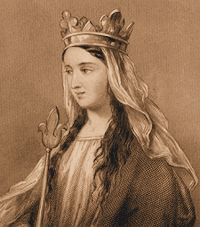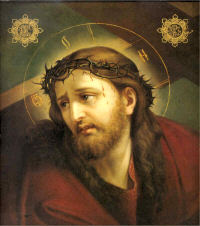Lent: March 14th
Tuesday of the Third Week of Lent
Other Commemorations: St. Matilda (RM)
» Enjoy our Liturgical Seasons series of e-books!
The point at which we most quickly become Pharisees is in refusing forgiveness. Failing often in greater or lesser ways, everyone must constantly ask forgiveness of God and men. Besides, the duty of forgiveness is binding upon all souls, and in regard to all. Only when fraternal correction fails and the common good requires, does authority step in to heal the damage of scandal by corrective action. Everyone else must forgive and love and keep strong the bond of brotherhood. United in love and in worship, especially at Mass and Holy Communion, we are one in Christ and sure to be heard by his Father when we pray.
St. Matilda (895-968) (also known as "Maud" or "Maude"), Queen of Germany and wife of King Henry I is commemorated today in the Roman Martyrology. She was well known throughout the realm for her generosity, she taught the ignorant, comforted the sick, and visited prisoners. She was betrayed by Otto after Henry’s death when he falsely accused her of financial mismanagement.
Meditation—Do Not Judge
Let us dwell for a while on that particular sin which Our Lord emphasizes specially — the sin of judging others.
The human heart is God's secret, we simply cannot know it; yet how readily we make judgements and impute motives. We feel absolutely sure of things, we get upset or feel angry, we fall into lots of other sins because we have allowed ourselves to judge.
No matter how obvious it seems to us, remember we simply cannot know another's motivations. All we are saying in fact is that if I did such and such it would be for these reasons, therefore these reasons must be hers, too.
The hidden sin of judging, so common, so little regarded, is a tremendous obstacle to God's love. Because it is secret, because it seems such a natural thing to do, because we feel we see things aright, we have no contrition, our consciences remain untroubled. Whereas a thing of less moral significance which is obvious to ourselves and others can rack us with guilt feelings which we mistake for real sorrow.
Contrition means 'never again.' 'With all my heart I renounce this habit. I will examine myself on it daily…honestly, ruthlessly…'
Plenteous grace with thee is found
Grace to cleanse from every sin.
Let the healing streams abound.
Make and keep me pure within.
(From Jesus lover of my soul v. 4. Charles Wesley
—Ruth Burrows, Through Him, With Him, In Him
St. Matilda (also known as "Maud" or "Maude")
 This princess was daughter of Theodoric, a powerful Saxon count. Her parents placed her very young in the monastery of Erford, of which her grandmother Maud was then abbess. Our Saint remained in that house, an accomplished model of all virtues, till her parents married her to Henry, son of Otho, Duke of Saxony, in 913, who was afterwards chosen king of Germany. He was a pious and victorious prince, and very tender of his subjects.
This princess was daughter of Theodoric, a powerful Saxon count. Her parents placed her very young in the monastery of Erford, of which her grandmother Maud was then abbess. Our Saint remained in that house, an accomplished model of all virtues, till her parents married her to Henry, son of Otho, Duke of Saxony, in 913, who was afterwards chosen king of Germany. He was a pious and victorious prince, and very tender of his subjects.
Whilst by his arms he checked the insolence of the Hungarians and Danes, and enlarged his dominions by adding to them Bavaria, Maud gained domestic victories over her spiritual enemies more worthy of a Christian and far greater in the eyes of Heaven. She nourished the precious seeds of devotion and humility in her heart by assiduous prayer and meditation. It was her delight to visit, comfort, and exhort the sick and the afflicted; to serve and instruct the poor, and to afford her charitable succor to prisoners. Her husband, edified by her example, concurred with her in every pious undertaking which she projected.
After twenty-three years' marriage God was pleased to call the king to himself, in 936. Maud, during his sickness, went to the church to pour forth her soul in prayer for him at the foot of the altar. As soon as she understood, by the tears and cries of the people, that he had expired, she called for a priest that was fasting to offer the holy sacrifice for his soul.
She had three sons: Otho, afterwards emperor; Henry, Duke of Bavaria; and St. Brunn, Archbishop of Cologne. Otho was crowned king of Germany in 937, and emperor at Rome in 962, after his victories over the Bohemians and Lombards.
The two oldest sons conspired to strip Maud of her dowry, on the unjust pretence that she had squandered the revenues of the state on the poor. The unnatural princes at length repented of their injustice, and restored to her all that had been taken from her.
She then became more liberal in her alms than ever, and founded many churches, with five monasteries.
In her last sickness she made her confession to her grandson William, the Archbishop of Mentz, who yet died twelve days before her, on his road home. She again made a public confession before the priests and monks of the place, received a second time the last sacraments, and, lying on a sack-cloth, with ashes on her head, died on the 14th of March in 968.
—Excerpted from Lives of the Saints, by Alban Butler, Benziger Bros. ed. [1894]
Patronage: death of children; disappointing children; falsely accused people; large families; people ridiculed for their piety; queens; second marriages; widows
Symbols and Representation: alms; bag of money; crown; orb; scepter; purse, indicative of her generosity; queen with a whip; queen holding a church
Highlights and Things to Do:
- Read more about St. Matilda:
- Read Spotlight on Queen Mathilda of Saxony.
- St. Mathilda's remains are in Quedlinburg Abbey next to her husband. The church is now used by the Lutheran Evangelical Church in Germany






